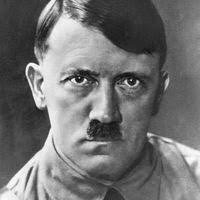Eps 2248: hitler
— The too lazy to register an account podcast
The podcast titled "Hitler" is a 10-minute discussion about Adolf Hitler and the rise of Nazi Germany. The podcast explores Hitler's early life, his role during World War I, and his political ambitions. It also delves into the techniques he used to gain power and his leadership strategies once he became Chancellor of Germany. The podcast acknowledges the atrocities committed under Hitler's regime, such as the Holocaust and World War II, and emphasizes the importance of understanding history to prevent such events from happening again.
| Seed data: | Link 1 |
|---|---|
| Host image: | StyleGAN neural net |
| Content creation: | GPT-3.5, |
Host

Stacey Pena
Podcast Content
Introduction:
Adolf Hitler, the name that forever stands as a symbol of hatred, evil, and the darkest chapter in human history. The rise and fall of this malevolent dictator, who led Germany into World War II and orchestrated the Holocaust, continues to captivate and horrify us even today. In this podcast, we will delve deep into Hitler's life, exploring the factors that shaped his ideology, the events that led to his ascension to power, and the catastrophic consequences of his actions.
Early Life and Influences:
Adolf Hitler was born on April 20, 1889, in Braunau am Inn, Austria. His childhood was marked by a strained relationship with his father and the distressing loss of his younger brother, Edmund. These experiences, combined with a voracious appetite for reading and a fascination with German nationalism, played a crucial role in molding Hitler's beliefs. During his early adulthood, Hitler moved to Vienna, where he faced hardships, failed art aspirations, and became increasingly radicalized by anti-Semitic and racist ideologies prevalent at the time.
The Birth of a Political Monster:
Hitler's entry into politics can be attributed to his service during World War I, which had a profound impact on him. In 1919, he joined the fledgling Nazi Party and quickly rose through the ranks. Hitler's charismatic speeches, fierce nationalism, and promises to restore Germany's former glory mesmerized the masses. By exploiting the prevailing economic and social crises, Hitler successfully tapped into the collective frustration of the German people and painted Jews as scapegoats for their woes.
The Machination of Nazi Germany:
In 1933, Hitler's ascent to power culminated with his appointment as Chancellor of Germany. Over the next few years, he skillfully dismantled democratic institutions, assuming absolute control under the guise of the Enabling Act. Hitler's regime implemented policies that targeted minority groups, enforced strict censorship, and transformed Nazi Germany into a totalitarian state. His ambition for Lebensraum (living space) led to the annexation of Austria and the invasion of Poland, sparking the outbreak of World War II.
The Holocaust and Open War:
While Hitler's wartime strategies initially brought him success, such as the swift victories in France and the establishment of puppet governments, his overconfidence ultimately proved to be his downfall. The failed invasion of the Soviet Union and the declaration of war by the United States weakened Hitler's hold on power. However, the most chilling aspect of Hitler's legacy remains the implementation of the Final Solution – the systematic extermination of six million Jews and millions of other innocent victims in concentration camps during the Holocaust.
The End of a Tyrant:
As Allied forces closed in on Germany from all sides, Hitler's desperation grew. In his final days, he retreated to his bunker in Berlin, surrounded by loyalists who shared his fanaticism. On April 30, 1945, Hitler and his longtime companion, Eva Braun, committed suicide. With his death, the world breathed a collective sigh of relief, but the scars left by his reign would forever haunt humanity's collective memory.
Conclusion:
Adolf Hitler, the embodiment of evil, left an indelible mark on world history. His ideology, driven by hate, bigotry, and a lust for power, brought devastation to millions of innocent lives. The rise of Hitler reminds us of the importance of vigilance against hateful ideologies and the grave consequences of unchecked authoritarianism. By understanding the complexities of his life and the events that unfolded during his reign, we can ensure that his legacy serves as a reminder of the horrors of the past, urging us to strive for a brighter, more tolerant future.
